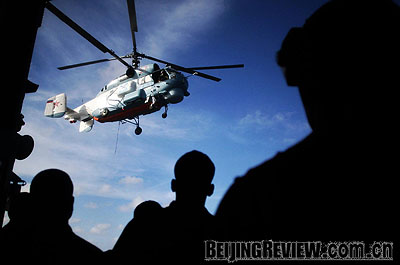|
Medvedev was the first Russian president to visit Venezuela since the Soviet Union disintegrated. During his visit, the two countries signed seven agreements in military, energy and financial fields. Russia agreed to help Venezuela build a nuclear reactor for civilian use, as well as set up a joint investment fund valued at $4 billion. In exchange, Venezuela will give Russia access to its natural gas and gold reserves. They also confirmed cooperation on nuclear energy, oil, natural gas and electricity and reached consensus on shipbuilding, aviation service, trade and investment, and transit without visas. Finally, they talked about Russia's weapons exports to Venezuela.
|
 WAR GAMES: Venezuelan Navy members watch a hovering Russian Ka-27 helicopter during joint naval maneuvers on December 2 in the Caribbean Sea (XINHUA/AFP)
WAR GAMES: Venezuelan Navy members watch a hovering Russian Ka-27 helicopter during joint naval maneuvers on December 2 in the Caribbean Sea (XINHUA/AFP) | Although their joint military exercise, which began on December 1, drew international attention, the two sides downplayed its significance, insisting that their cooperative focus was still on the economy. Medvedev and Russian military officials said the exercise was not aimed at any other country or intended to display aggression.
But Russia has undeniably expressed a greater interest in Latin America. Russian Deputy Prime Minister Nikolai Patrushev visited Cuba and Venezuela earlier this year. Putin, now prime minister, has said that Russia needs to recover its lost position in Latin America and in other places around the world. Some Russian officials have suggested reestablishing Russian military presence in Latin America. In the meantime, Russia's political, economic and military relations with Cuba have been improved and strengthened.
Still, the joint military exercise has more symbolic than practical meaning. Russia's aim is to put U.S. President-elect Barack Obama on notice and create leverage for future military dialogue between Russia and the United States. Through the military exercise, Russia is trying to send a hardline message to Obama.
Foundation of cooperation
The cooperation between Russia and Venezuela is based on the strategic squeeze they have experienced during the Bush administration and a shared desire to protect their own interests.
Venezuela says it is working for a multi-polar world. By strengthening energy and financial cooperation with Russia, President Hugo Chavez hopes to increase oil exports and break the U.S. dollar monopoly. Russia is an ally that will help Venezuela realize its political ambitions. In mid-September, Russia flew two Tu-160 bombers to Venezuela-the first time strategic bombers had landed in the Western Hemisphere since the end of the Cold War. Chavez welcomed their arrivals as another step toward a multi-polar world and "the end of U.S. hegemony."
It is clear that Russia's renewed focus on Latin America is a response to aggressive American actions worldwide, not just in Latin America. Threatened by the missile defense system the United States is deploying in Eastern Europe, Russia seeks to make the United States equally uncomfortable in its own backyard. Venezuela seems to be the best place to start.
The growing military relations between Russia and Venezuela have been the focus of world attention since 2005. Over the past three years, the two countries signed 12 military purchase contracts worth $4.4 billion. In addition, Russia is now building three defense equipment plants inside Venezuela.
| 